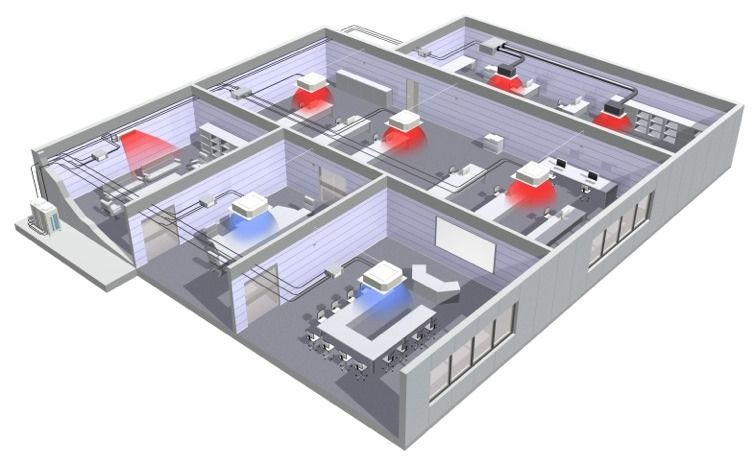In New York City or Long Island
Make smart choices, save money!
There are more than 105,000 heating, ventilation and air conditioning companies in the United States.
But you want to find the best heating contractor in New York City or Long Island, so let’s help you narrow the search.
This may require some detective work on your part, but it will be time well spent considering the cost of equipment, installation, repairs and utility bills.
A furnace repair can cost from $100 to $1,000, so there’s serious money at stake here. Buying and installing a new furnace will cost thousands more.
What does a heating contractor do?
A good heating contractor needs a lot of knowledge and experience to do a top-quality job.
He installs and repairs heaters, vents and air conditioners – and skillfully removes outdated systems.
He works on ductwork, thermostats, furnaces, boilers, and other heating sources, such as heat pumps.
A full-service heating contractor knows how to seal ducts, repair broken equipment and conduct periodic checks to make sure the system is running to its potential.
How do I choose an HVAC contractor for my home or business?
Start your search by checking with friends, relatives, neighbors and co-workers. Their experiences can help you narrow the search and tell you which heating contractors to put at the top of your list.
• Look on line at reviews, but take them with a grain of salt because, as the old saying goes, you can’t believe everything you read.
• A contractor’s website also gives details on the quality of his work and his expertise.
A heating contractor normally is part of a full-service HVAC company, which also may provide plumbing, ductwork and chimney cleaning.
• Be curious. Ask questions. Your money and comfort are riding on the answers.
• Go on-line and Google the type of contractor you want – such as “air conditioning repair New York.”
Or you can become more specific and Google “best heating contractor Brooklyn” or “heating and air conditioning in Brooklyn.”
You will find plenty of websites with information.
• Does the contractor have a local business address and welcome you to visit, or does he operate from a mobile phone, a sign of a one-person operation that might not be easy to find if things go wrong.
• Does the company have all the necessary licenses and certification.
• Does it guarantee its work?
• You may not want a contractor far from your home or business. When your heat dies, you want someone who can respond quickly, with the parts and tools needed to keep your family safe and comfortable.
• Check the Better Business Bureau.
Getting closer to a decision
Soon you will find yourself narrowing your choice to three or four HVAC companies.
Call them and see how they respond to your questions. Are they gruff and unfriendly or are they patient and eager to help?
With all this information, you will be ready to answer the question, “How do I find an honest company in HVAC?”
If it’s a small repair or an annual checkup, you may decide to choose a contractor and see how well he does. This is the ideal way to start because it gives you time to decide if you want to build a relationship with this company or go elsewhere.
Get it in writing!
If it’s a big job – a new system or a major overhaul – you should get written bids from three or more contractors. The bids should include a timeline and the date when work will be completed – to your satisfaction!
To handle a large job properly, a heating and cooling contractor must first visit your home or business to understand the scope of work.
Every building has specific heating needs and circumstances, which a conscientious contractor will want to examine firsthand so he can write an honest, comprehensive proposal.
Ask each contractor to spell out each step of the project and the cost of parts. Then you can better compare the various quotes.
The interview
When a contractor visits your home, you will pick up clues to his knowledge and integrity:
• Is he on time?
• Does he answer your questions in layperson’s terms or throw a lot of technical talk at you?
• How many jobs like yours has he done?
• Will the contractor be on-site for the job or will he leave the work to employees? If so, what are their qualifications?
• Did he put his guarantee in writing, and did he volunteer information about possible rebates or discounts?
Replace or repair?
Sometimes an aging system has a streak of problems and the owner is unsure whether to keep it or get a new HVAC.
A heating and cooling contractor can help you weigh numerous factors, such as:
• Does the current system still have a good life expectancy or is it likely to need more expensive repairs soon?
• What are the trade-offs of buying a new, more energy efficient system now versus keeping the current system?
• What’s the right size system for your building?
• How many people live or work there, and what hours do they keep?
Factors affecting HVAC
Various issues affect a system’s performance:
• The siting. If the home faces west, for example, it gets much of its heat late in the afternoon.
• Are there many tall trees around the property to provide shade?
• Does the building have skylights and large windows that draw sunlight?
• Are the ducts in good shape or do they need repair?
Equipment
The largest HVAC companies in US include many well-known, reliable fixtures such as Goodman, Rheem, Trane, Lennox International, and Daikin. In addition, Japanese companies such as Mitsubishi have made strong entries into the U.S. market.
Most companies include long warranties on their equipment, and most make very durable parts.
The top HVAC companies in New York work with most, if not all, of these brands.
Mixture of buildings
New York City and Long Island have a wide mix of building choices, which means a wide mix of heating and cooling choices.
You can see the choices in the difference between large and smaller buildings. Some HVAC contractors handle both large and small buildings while others focus on a single type.
You want a heating contractor who has plenty of experience on your type of home.
One-family and two-family homes
A forced-air system is often used in one and two-family homes. Blowers force hot or cold air through ducts, which lead to vents that deliver the treated air into each room. (Note: Make sure furniture, curtains or other items don’t block the vent from releasing the air.)
Central heating
Both furnaces and boilers provide central heating. That is, they create the heat in a central place and then distribute the het throughout the building.
As you can imagine, each system has its advocates and its detractors.
Multi-unit buildings
Bigger buildings often favor forced air or steam systems, especially for commercial office buildings and apartment houses.
A boiler heats the water, and then sends hot water or steam through pipes, usually to freestanding or baseboard radiators in every room. When the radiators get hot, they radiate the heat around the room.
Boilers
Boilers, which are very common in New York City, have become much more efficient as technology constantly makes advancements.
Today’s boilers are as much as 95 percent efficient, almost twice as much as they once were, according to the Department of Energy.
This means they waste virtually no fuel and require less power, a benefit for both your utility bill and the environment.
Boilers have a life expectancy of 15 to 30 years, maybe even longer if they are maintained.
In an annual maintenance check, the technician will check your components and study the water pressure. Inadequate water pressure will keep the system from properly heating your building.
One virtue of boilers: They don’t waste water. Instead, they constantly recycle the water.
Boilers also have an edge over furnaces because they usually are quieter and provide a better quality of indoor air.
More pros and cons
Steam heat has edges over hot water and vice versa.
Hot water systems don’t deliver heat as quickly as steam systems, and they may use more electricity.
But with a hot water system, residents usually will enjoy a more even distribution of heat in the building. Hot water systems have fewer parts that need maintenance, and they are very quiet.
Another point in favor of hot water systems: They can be easily adapted to serve multiple heating zones.
Steam systems are more likely to produce uneven heating – too cold in one unit, too hot in another. And steam heat systems sometimes are prone to “water hammer,” a banging noise created when water condenses in a horizontal pipe and can’t drain back to the boiler. “Water hammer” is disruptive for residents and eventually can damage the pipes.
Furnaces
Furnaces are much less expensive than boilers, for both purchase and installation.
Furnaces use oil or natural gas to heat air, which is circulated through ducts.
Oil furnaces cost considerably less than natural gas furnaces, but they are only 80-90 percent fuel-efficient. A natural gas furnace is much more efficient, especially if it has the latest technology.
A natural gas furnace uses ducts, which can also deliver air conditioning, too.
Most furnaces last 15-20 years.
Maintenance works
When it comes to the care of your heating system, scheduled maintenance and cleaning will extend its life and avert big breakdowns.
• Rule 1, which virtually anyone can do: Periodically replace or clean the filters. They capture the dirt and debris that inevitably are stirred up by the HVAC system. But when they capture too much dirt and debris, they stop letting the air circulate, setting off a chain of unpleasant possibilities.
Filters come in various strengths for capturing particles. Each filter has a Minimum Efficiency Reporting Value.
Some people prefer pleated mechanical devices known as "high efficiency particulate air filters.” The HEPA filter “can theoretically remove at least 99.97% of dust, pollen, mold, bacteria, and any airborne particles with a size of 0.3 microns,” according to the U.S. Environmental Protection Agency.
Filters should be changed monthly during periods of high use.
• Other parts need cleaning, too. Dust and dirt can settle on condensing units, blowers and other components, slowing them from doing their job at full strength.
• The condensate drain should be checked for a backup of moisture, which can lead to mold and poor air quality.
You may choose to hire a trained technician to check on other, more complicated HVAC operations.
• A system’s electrical connections need a review to make sure nothing is loose or frayed.
• Parts must be lubricated and checked for wear and tear.
• The refrigerant level should be among the first items a technician checks. If the refrigerant is low, the system must work harder, risking major damage to the compressor.
HVAC refrigerant is toxic, so a leak can be very dangerous. Call a technician if you hear a hissing sound or suspect a leak.
• Another must: The technician should check the heat exchanger, which keeps deadly carbon monoxide gas from entering the system’s airflow. system.
About Premier
Premier HVAC is a full-service company serving Brooklyn, Queens, Manhattan and Long Island.
A locally owned company, Premier is based in Sheepshead Bay and keeps strategically located workstations to respond more quickly to calls.
Our employees are licensed, experienced and puntual!
Premier guarantees its work.
Available 24/7.
(917) 275-3280





